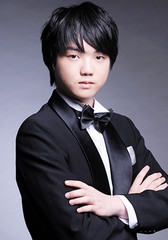|
Back
Fingers More Than Feelings New York
Ida K. Lang Recital Hall, Hunter College
07/19/2019 -
Wolfgang Amadeus Mozart: Sonata No. 10 in C Major, K. 300h [330]
Franz Liszt: Transcendental Etude No. 10 in F minor, S.139/10
Sergei Rachmaninoff: Etude-tableau in E Flat minor, Op. 39 No. 5
Pyotr Ilych Tchaikovsky: Dumka in C minor, Op. 59
Frédéric Chopin: Four Scherzi, Op. 20, Op. 31, Op. 39 & Op. 54
Mao Fujita (Pianist)

M. Fujita (© Courtesy of the Artist)
“Sometimes I can only groan, suffer, and pour out my despair at the piano. I wish I could throw off the thoughts which poison my happiness. And yet I take a kind of pleasure in indulging them."
Frédéric Chopin 1810-1849)
“How will gravity array itself, if wit is already cloaked so darkly?"
Robert Schumann about Chopin’s Scherzo in B minor
The International Keyboard Institute and Festival has two faces. First is a concentrated list of well-known pianists, people like Vladimir Feltsman, Jeffrey Swann, Ann Schein and the Festival organizer, Jerome Rose. Second is the presentation of younger pianists.
Not students by any means. These youngsters like George Li and last night’s Mao Fujita have won many important awards in their burgeoning careers, but they are hardly household names. This, though, hardly precludes full houses, audiences even on stage.
Such was the case yesterday for the New York debut of Mao Fujita, winner of the Silver Prize at the Tchaikovsky International Piano Competition. And while only in his very early 20’s, the pianist showed the confidence of artists twice that age.
His recital was that of a performer who knew his music, knew his technique, and obviously enjoyed most of the pieces he chose. What he lacked–and which he will hopefully gain over the next few years–is individuality.
The great and near-great artists can take an early piece like the Mozart K. 330 Sonata, soothing their way past the classically wrought outer movements (as did Mr. Fujita), but give special treatment to the Andante cantabile. This is a movement with strange modulations, sudden tragic moments, Mr. Fujita gave it a careful reading, yet the feeling was inflexible. Literally an A-Plus. Spiritually, dismal.
The two Etudes by Liszt and Rachmaninoff were given equally respectable performances The Liszt F Minor Transcendental Etude was rushed, agitated, Mr Fujita’s fingers moving headlong to the finales, yet one was left with speed more than emotion.
Ditto the fifth Opus 39 Etude-Tableau by Rachmaninoff. It takes more than audacity to tackle any of these pieces, and Mr. Fujita was digitally prepared. Yet in the long run, this was a show of ferocity, not ferocity itself.
The only relatively unfamiliar work was the Dumka by Tchaikovsky, and while Mr. Fujita was not terribly Slavic, that dance has as many cadenzas and semi-cadenzas as a sonata, with double-octaves galore, all of which had superb preparation and execution.
The second half was an even greater challenge. All four Chopin scherzos. With a more established pianist, one could sit back, forget about adjectives and simply enjoy the startling beauty and pathos together. Does the Second Scherzo sometimes fall apart structurally? Forget it! Is the B Minor Scherzo dependent on the ferocious coda for its success? Not important. There’s far too much meat in between.
To his credit Mao Fujita played up thunderously in all the works. In fact, it was damned good playing. The word “good”, though, hardly does credit to Chopin’s greatness.
He opened that First Scherzo a modified shriek, played the middle Polish Christmas carol fluidly, finished with fluent (if hardly furious) coda. The Second showed more masterly piano-playing. That is, it was fine piano, it was not masterly Chopin.
I doubt if this excellent young technician had any nervousness for his first works (though nerves might have offered more personality, more memorability). His performance of the last two Scherzi was more outgoing, more interesting. Yet I had to compare the Third Scherzo wit a performance heard four days ago by Jeffrey Biegel. Here, the splendid chorale was contrasted with color, with variation of the falling arpeggios.
Mao Fujita played them as written, errorless, pleasant. Like all his music yesterday, Mr. Fujita offered notes, measures, phrases as if on an endless Urtext, as if, in his care on the keys, he had distanced himself from the meaning of the music.
Harry Rolnick
|